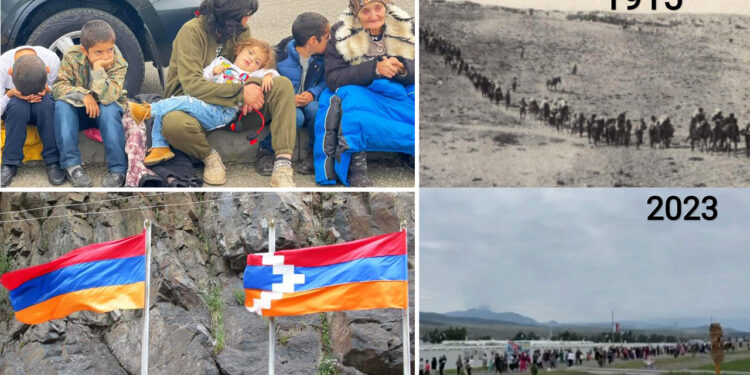A Russian-brokered ceasefire agreement was reached on Wednesday following a large-scale attack by Azerbaijan on Nagorno-Karabakh (known to Armenians as Artsakh) on the previous day, that resulted in 25 deaths and 80 injuries.
Described by Azerbaijan as a “counter-terrorism operation”, the attack led to the evacuation of more than 7,000 Armenians from six villages and raised fears of a demographic shift in the ethnic Armenian enclave.
The ceasefire agreement, facilitated by Russian peacekeeping forces in Karabakh, stipulates the cessation of hostilities and the withdrawal of the remaining Armenian armed forces. Discussions regarding the reintegration, rights and security of Artsakh Armenians within the framework of the Azerbaijani Constitution are planned for 21 September in the city of Yevlakh.
Armenian Prime Minister Nikol Pashinyan accused Azerbaijan of initiating a ground operation to subject the people of Artsakh (Nagorno-Karabakh) to ethnic cleansing. He called for action from Russian peacekeepers and the United Nations Security Council. Meanwhile, opposition protests took place in Armenia’s capital, Yerevan, accusing Pashinyan of ineffectiveness on the Karabakh issue.
Internationally, the European Union called for an end to the military actions of Azerbaijan. US Secretary of State Antony Blinken described Azerbaijan’s military actions as unacceptable and called for an end to hostilities. Turkish President Erdoğan and the Turkish Foreign Ministry, however, expressed support for Azerbaijan’s actions, stating that Baku had to take necessary measures on its sovereign territory.
An emergency meeting of the United Nations Security Council is expected on 21 September in response to the situation.
Azerbaijan’s influence in the international arena is significantly bolstered by its oil exports. The country is a major supplier to European markets, which provides it with significant economic leverage. This influence, sometimes referred to as “caviar diplomacy”, potentially impacts the international response to its actions in Karabakh.
The term “caviar diplomacy” was first coined in a 2012 report by the European Stability Initiative, with the title “Caviar Diplomacy – How Azerbaijan silenced the Council of Europe”. It describes Azerbaijan’s strategy of offering generous gifts to foreign politicians to gain influence. This form of diplomacy, coupled with Azerbaijan’s significant oil reserves, provides the country with considerable sway in international relations, enabling actions such as the current military operation in Karabakh.










